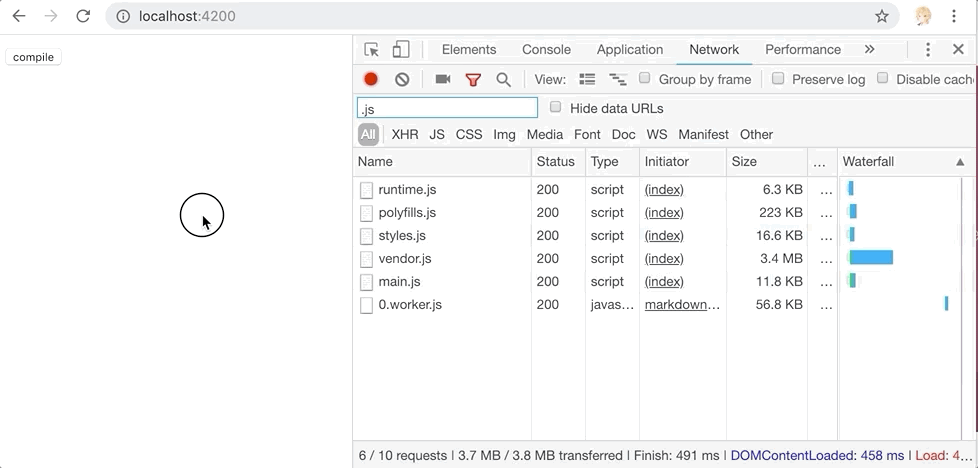Web Workers have attracted the attention as one of the most important things of web development. Comlink is a JavaScript library created by Google Chrome team to make WebWorkers enjoyable. It provides an easy way to communicate with classes defined in Worker-side.
This post explains how to integrate Comlink with your Angular application that created by Angular CLI. By using Comlink, You will be able to move away heavy processing off-the-main-thread easily and make JavaScript bundles smaller by code separation. Let’s get started!
[Change from Angular CLI v12.0]
- Syntax for worker module was updated since webpack v5. CLI v12 can migrate automatically by executing
ng update @angular/cli@12.


Setting up an application
Create an example application by using Angular CLI.
$ ng new angular-comlink-example --defaultsAfter application setup, install Comlink as the below. Comlink has its own TypeScript definition in the package, so you don’t need additional installation.
$ cd angular-comlink-example
$ yarn add comlink # or npm install comlinkImplement worker module
For example, let’s make a markdown processor which can convert markdown text to HTML. At first, install marked and @types/marked to compile markdown to HTML.
yarn add marked && yarn add --dev @types/markedNext, create src/tsconfig.worker.json for the application project. Its location is next to tsconfig.app.json.
{
"extends": "../tsconfig.json",
"compilerOptions": {
"outDir": "./out-tsc/worker",
"lib": [
"es2018",
"webworker"
],
"types": []
},
"include": [
"**/*.worker.ts"
]
}Create a file named markdown.worker.ts in src/app/worker directory and write a function as the below. This file will be the entry point of the worker module.
$ touch src/app/worker/markdown.worker.ts// worker/markdown.worker.ts
import * as marked from 'marked';
export const api = {
compileMarkdown(source: string) {
return new Promise<string>((resolve, reject) => {
marked(source, (err, result) => {
if (err) {
reject(err);
return;
}
resolve(result);
});
});
},
};To expose that functions as the worker, call Comlink.expose function and pass the api object.
import * as marked from 'marked';
import { expose } from 'comlink';
export const api = {
compileMarkdown(source: string) {
// ...
},
};
expose(api); // Expose as worker's APIThat’s all to implement Worker-side code. Just write a function and expose it. Ain’t easy?
Use the exposed worker APIs
Next step. Let’s call the compileMarkdown function through Comlink. At first, create MarkdownService as Angular service to separate business logic from component. Execute following command;
$ ng generate service service/markdownAnd here is an initial implementation.
import { Injectable } from '@angular/core';
@Injectable({
providedIn: 'root',
})
export class MarkdownService {
async compile(source: string): Promise<string> {}
}To use worker/markdown.worker.ts , import Comlink and create a proxied worker instance with wrap function as the below. A module worker instance is instanciated by new Worker(new URL('../worker/markdown.worker', import.meta.url). This syntax is defined by webpack’s Web Workers support.
import { wrap } from 'comlink';
async function compileMarkdown(source: string): Promise<string> {
const worker = wrap<typeof import('../worker/markdown.worker').api>(
new Worker(new URL('../worker/markdown.worker', import.meta.url)),
);
return await worker.compileMarkdown(source);
}Now worker instance has functions exposed by Comlink.expose with its types.
To retrieve type of api, pass typeof import('../worker/markdown.worker).api into wrap<T>. This import is not ES Module import but TypeScript’s feature that import only type definition without any JavaScript references which will be eliminated after TypeScript compilation process and it can be separated to different bundles.
The following is the final example of service/markdown.service.ts. If the environment doesn’t support window.Worker, it will fallback to on-the-main theaed processing with dynamic import() to keep the initial bundle small.
import { Injectable } from '@angular/core';
import { wrap } from 'comlink';
async function compileMarkdown(source: string): Promise<string> {
if (window.Worker) {
const worker = wrap<typeof import('../worker/markdown.worker').api>(
new Worker(new URL('../worker/markdown.worker', import.meta.url)),
);
return await worker.compileMarkdown(source);
} else {
// Fallback to main thread with dynamic imports
const worker = await import('../worker/markdown.worker').then((m) => m.api);
return await worker.compileMarkdown(source);
}
}
@Injectable({
providedIn: 'root',
})
export class MarkdownService {
async compile(source: string): Promise<string> {
return await compileMarkdown(source);
}
}Run the app!
Finish the application. Here is AppComponent modified to use MarkdownService and show the result.
import { MarkdownService } from './service/markdown.service';
import { Component } from '@angular/core';
@Component({
selector: 'app-root',
template: `
<button (click)="compileMarkdown()">compile</button>
<div>{{ result }}</div>
`,
})
export class AppComponent {
result: string = '';
constructor(private markdown: MarkdownService) {}
async compileMarkdown() {
this.result = await this.markdown.compile(`## Hello Comlink`);
}
}Let’s serve the app by usingng serve and open browser’s devtool. 0.worker.js is a chunk that is split by WorkerPlugin. It is loaded lazily after initial scripts are all loaded. It doesn’t block the initial rendering. Cool!

Summary
- Use Comlink to define worker and expose async APIs.
- Angular CLI supports worker code separation with zero-config.
- TypeScript support from Comlink perfectly.
All sample code is public in GitHub.
Any feedback is welcome. Thanks for reading!!